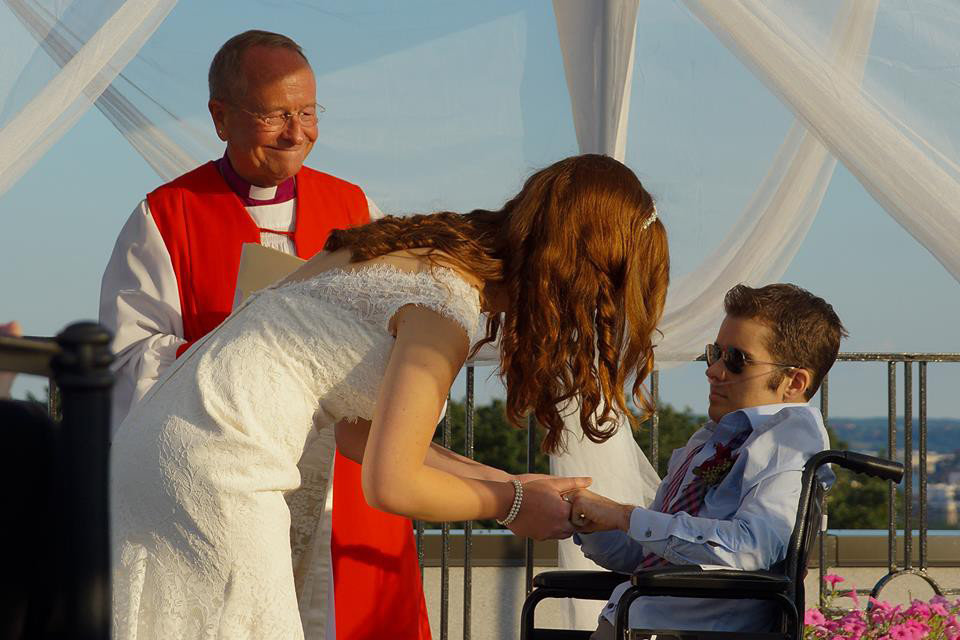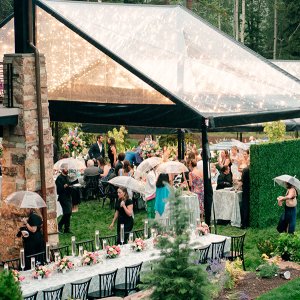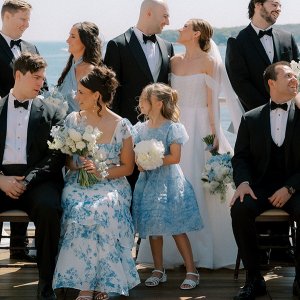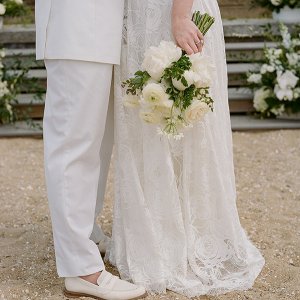“If it turns out that this is incurable, would you marry me?” is not your traditional marriage proposal, but then again, Andy and I haven’t lived traditional lives.

“My Big Bean”
Andy and I first met after literally running into each other at a White House reception honoring the lesbian, gay, bisexual, and transgender community in June of 2012. I was fortunate enough to have been invited after coming out publicly as a transgender woman while serving as student body president at American University just a month before. Andrew, 26 at the time, had come out as a transgender man several years prior and was now a leading LGBT health policy advocate in Washington, DC.
I hadn’t given our clumsy “meeting” at the White House much thought until I received a charming and suave Facebook message from that handsome guy two months later. His friends now tell me that he spent hours writing and re-writing the short message, in which he asked me out for coffee or drinks. After several online conversations and a few more chance encounters while I interned at the White House, we finally managed to find some time to go out for dinner.
We quickly found that we had far more in common than our transgender history, no doubt an important component of our identities, but still only one part. We both had a passion for law and politics, a love of “trash television” as he would call it, a desire to travel, and incessant need to be right. We both got involved in politics after an intense interest in film. We both loved Star Wars, although his love dwarfed anything I could muster. And we both had an obnoxious affinity for baby-talk and nicknames, he was the “big bean,” to my “little bean.” I still maintain that I certainly had the better deal: he was generous, loving, smart, funny, and enjoyed just the perfect mix of hard work and play. Many of the traits I’d find common in people from his beloved home state of Wisconsin.

In no time we were attached at the hip. Just a few weeks into our relationship he accompanied my family and me on a trip to Barbados. I quickly became part of his family and he quickly became part of mine. In no time, he was my partner and my best friend. To top it off, we even ended up becoming colleagues, when I joined him to work at the Center for American Progress. We began to talk about our future together, believing that it stretched far beyond anything we could imagine.
Our relationship took on a whole new dimension when Andrew was diagnosed with oral cancer in his tongue in September of 2013. I thought and hoped that the succeeding few months would be the toughest that we would have to endure for some time. In October, Andy underwent a twelve-hour surgery to remove part of his tongue and reconstruct it with a graft from his arm. Just as he relearned how to talk and eat, he had to undergo an intense regimen of radiation and chemotherapy that left him in so much pain that he could barely breath without a stabbing sensation in his mouth.
And then in April, he was proclaimed “cancer free!” As frightening and as stressful as that experience was, it gave us a bond that few couples our age develop so quickly. When we received the positive results in April, we knew we were not totally out of the woods yet, but we began to start to plan for our lives ahead.

But then the world that he had rebuilt after his first diagnosis came crashing back down in July of 2014 when he developed a mild, but persistent cough and chest pain. After several tests and a short hospital stay, the news came back like a punch in the gut: Andy’s cancer had returned and had spread to the lungs.
It was in the 24 hours after this news that Andy asked me, “If it turns out that this is incurable, would you marry me?” Of course the answer was yes. Andy had always wanted to get married, but prior to this new diagnosis, there was never any rush. He was only 28 and I was just out of college.
When we got the news that the illness was “life shortening,” as doctors say, his soul was understandably crushed. At the time, we were told that with treatment, he would probably have about a year left.
The next two weeks were a blur of silence, disbelief, and crying. Lots and lots of crying. Crying about the fear of death. Crying because he wouldn’t be able to see his family and friends grow up. Crying because, as he said, “he wouldn’t be around to say ‘I love you, bean,” or ‘I’m proud of you, bean.’”
And as the crying gave way to determination — determination to both live as long as possible and as much as possible — we decided to move forward with a wedding.
Andy was scheduled to start chemotherapy in the next few weeks in order to perpetuate his life. Because we thought we were operating with a year left, we tentatively set our wedding for mid-October. Both of us had always wanted a fall wedding anyway; the colors, the temperatures, and, for a DC couple, the lack of humidity were all appealing.
“Two weeks? I’m not ready for this ‘A Walk To Remember’ shit.”
But on Thursday, August 14th, the third full day of Andrew’s second stay at our local hospital and two weeks before he was supposed to start treatment, one doctor threw a wrench into our plans and cold water on Andy’s hopes.
“I’m saying you might not make it to treatment,” the doctor said.
These were the first words I heard as I walked into Andy’s hospital room after taking a shower back at our apartment. As I came around the corner, I saw the stunned look on Andy’s face.
“So you think I may only have two weeks?” Andy asked, his face as white as the Wisconsin snow he may never see again.
“Yes,” the doctor continued and then paused. There was silence. I wasn’t quite sure where he was going next. He seemed to be deep in concentration, which would make sense given the gravity of the news he had just delivered.
“Hold on, there is a fly. Let me kill it.” He lifted his hands up, getting ready to smack the fly to death. The silence continued, only broken by a loud clap.
The body of the fly fell to the floor. The doctor paused again, said “hold on, let me pick it up,” as he slowly bent over, lifted the fly’s body, and threw it in the trash.
I wanted to scream at the doctor’s coldness, but I was stunned into silence by both the news and the indifference with which it was delivered.
After 45 seconds, which naturally felt like an hour, Andy, who couldn’t bare awkwardness, finally broke the silence and said to the doctor, “nice job.”
Eventually, the doctor continued. He instructed us that one of Andy’s lungs was failing at a rapid rate. “You need to decide whether you will want to go on a respirator. Just know, though, given your condition, if you go on a respirator, you will likely never be able to be taken off. And to put you on a respirator, you will have to be sedated, and, given your condition, you will likely never wake up.”
Moments later, another doctor came in and apologized profusely. It seems she had over-hydrated Andy after thinking his heart was racing from a lack of fluids. The doctor who had just delivered Andy’s “two-weeks notice,” seemed surprised and slightly relieved that there was a potentially reversible reason for the episode. The cardiologist prescribed some medications and reduced his fluid intake. Sure enough, Andy rebounded and by that afternoon was better than he had been since being admitted to the hospital in the first place.
As the two doctors left his room, we were confused. Did Andy have two weeks left or was his rapid decline of this morning merely a temporary problem that was easily fixed? Unsure, Andy turned to me and said, “Two weeks? I’m not ready for this ‘A Walk To Remember’ shit.” He had been fighting to live, but now it seemed he was merely fighting for a year.
Over the next few hours, neither doctor returned to our room with any more information. We asked any medical professional who entered our room for an update, from the nurses, to the palliative care team, to the young hospitalist. No one could provide much clarity as to what we were looking at in that moment. The general consensus was that Andy didn’t look like someone with two weeks left. In fact, by that evening, he was stable enough that the decision was made to discharge Andy in the next few days.
The next day, after Andy’s mother had suggested moving up the wedding, I broached the subject with him. He seemed to receive the idea well, although with concern that moving the date meant something about his prognosis. I explained that we weren’t moving the date because his prognosis had changed, but rather that the chemotherapy would take more out of him than we anticipated. Determined to reach the wedding, he said, “Let’s do it.”
“Forever and ever, forever and ever, forever and ever…”
The first full day back at the apartment, our friend and colleague Bishop Gene Robinson, the first openly gay bishop in any major Christian denomination, came by our apartment to discuss the possibility of a wedding. After talking with Bishop Gene for about an hour, we decided to move forward with a wedding that weekend, then just five days away.
Bishop Gene, as well as several close friends, offered to do all the planning, logistics, and organizing for the wedding. All we had to do was to get the marriage certificate, for me to buy my dress, and to make the occasional decision. Given Andy’s limitations, we decided that we would host the wedding on the roof of our apartment building, a beautiful space for about fifty that has magnificent 360-degree views of Washington, DC.
Over the next several days, as preparations for the wedding continued, Andy’s situation deteriorated. With each passing day, he could walk less and required a little more oxygen. He slept more and more. Daily tasks that once took five minutes for Andy, now took thirty minutes or an hour with the help of multiple people. Eventually, eating became a labor for him, taking him four hours to down fifteen spoonfuls of an ice-cream/medicine mix.
The only respite from the constant struggle to keep him nourished and hydrated came when I would talk with him about the wedding. You could tell he was trying his hardest to stay awake and alert for those conversations.
A few days earlier, Bishop Gene had sent us a draft of the wedding ceremony based on the Episcopal Church’s service. With Andy’s permission, I went through and edited it for us. I removed any mention of death in the ceremony and replaced it with “forever and ever.” Given his condition, I also reduced the amount of lines we had to speak to three simple sentences:
“I do.”
“That is my solemn vow.”
And, “Please accept this ring as a symbol of my abiding love.”
I knew he would not be able to remember these lines, so I wrote them out, as well as the last sentences before them. After working on the service for about an hour, I came out of our bedroom and asked him if we could go over it.
By this time, Andy was sleeping most of the day. His activities were looking less like someone with ten or even two months left, and more like someone who had a week or two. I tried reading the entire service to him, but he fell asleep pretty quickly. When he awoke, I decided to only read to him his parts and the sentences before his lines, including the line, “Will you honor and love her forever and ever?”
After I asked him if he was okay with that and told him that I had made a cheat sheet so he didn’t have to memorize anything, he started to drift off to sleep again. As his head began to fall back and his dreams came again, I heard him mumbling. I wasn’t sure if he needed something, so I walked over to his chair and leaned in.
He kept mumbling the same thing over and over again. I leaned in further to hear him more clearly, “forever and ever, forever and ever, forever and ever…”
“My wedding day.”
The morning of our wedding — August 24, 2014 — came without incident. No shortness of breath. His eating had marginally improved. The weather, which had initially been forecast to be rainy, turned out to be the nicest day of the month. Mid-80s, sunny, just the right amount of breeze. Our families had come in from out of town. Old friends and new friends were ready and excited. It was turning out to be a beautiful, albeit bittersweet day.
I was getting ready in our neighbor’s apartment across the hall when about an hour before the ceremony one of Andy’s best friends knocked on the door. He was out of breath and clearly shaken.
“Andy just had an episode. He started to collapse and go unconscious when he was moving from his recliner to his wheelchair. He is awake and his vitals are okay right now, but we called the police and the EMT’s are on their way.” Luckily, my brother, a radiation oncologist, had offered to be with Andy while he got dressed for the wedding and was there to help.
With my hair up and my wedding dress still hanging on the wall, I ran over to our apartment. I found Andy in the recliner with my brother and our friends around him. I walked up and he apologized, “I’m sorry, are you mad at me?”
“Of course not, beanie,” my nickname for him, “Of course I’m not mad at you.”
As we heard the sirens approaching our building from the outside, my brother asked Andy several questions to ensure he hadn’t had a stroke.
“What is your name?”
“Andrew Cray.”
“Where are we?”
“My apartment in Washington, DC.”
“What is today?”
He got the date wrong by a few days, but also answered, “my wedding day.”
The EMT’s entered the apartment and made their way through the medical equipment and wedding supplies. With the caterer preparing the small amount of food for our wedding in the next room, the EMTs performed an EKG and consulted with my brother. Andy was adamant that he did not want to go into the hospital, knowing what that would mean for our wedding and for his chances at chemotherapy. With his vitals normal, the EMT’s acquiesced.
As they left, I asked Andy if he wanted to move the wedding into the apartment or to cancel it all together. He shook his head and said, “No, this is happening.”
As I walked back across the hall, my brother informed me that he wasn’t sure Andy could make it up to the roof in his wheelchair, but that we would see how he did over the next half an hour.
But my Andy rallied. With the help of three people, Andy was able to get into his dress clothes and, with oxygen in tow, he made it up to the roof.
I exited the elevator just as Andy was being wheeled onto the rooftop patio. As the elevator door slid open, I could see the back of Andy’s wheelchair moving down the narrow path to the opening on our roof where our wedding was to be held. As he approached the fifty family members, both blood and chosen, they started to applaud for him, unaware that just an hour earlier, EMT’s were in our apartment ready to take him to the hospital.
Clearly feeling as though he had conquered the world, Andy lifted his arm in triumph and gave the group a big thumbs up, his trademark. After they quickly switched Andy from the portable to stationary oxygen supply, I made my way out to the roof on my father’s arm.
I had no idea what my wedding was going to look like. Our friends had put it all together for us in five days with hardly anything more than a color preference from us. And it was beautiful. The bouquets included my favorite flowers — purple orchids and blue hydrangeas — a fact that was unknown by the friend who ordered them. Andy was stationed under a white tent surrounded by flowers and sitting in front of our dream officiate, Bishop Gene Robinson.

As I approached Andy, I could see him starting to choke up. We had always talked about getting married and he had asked me several times if I thought we would some day.
My mother says that it was clear Andy loved me from the first time we met and clearly always wanted to spend the rest of his life with me. I don’t know about that, but what I do know is that we were committed to each other for life long before we got married. Our ceremony on that day merely formalized, before family and by the state, what was already a reality between us. We had been through so much together. We were already bound together by both the superficial, like our love of reality television, and the deep, like our mutual commitment to equality and social justice. We had each walked beside the other during some of the most trying times in our lives.
Fortunately, we got through the ceremony without any problems. We exchanged our rings and committed ourselves to one another. He had forgotten the cheat sheet downstairs, so he improvised his lines. Shortening them so they wouldn’t make him short of breath or cause him to cough.
After taking a few pictures and receiving a few hugs, Andy was exhausted and decided to go back to our apartment with a few of his friends. I remained on the roof with our remaining guests for another hour and then went back downstairs to be with my new husband.
The first thirty-six hours of our marriage were a lot like the previous thirty-six. There was nagging over his food intake, a lot of sleeping, and a boatload of comforting reality television.
What was different was that Andy had three more episodes like the one he had just an hour before the wedding. Each time, he was about to move from his recliner to his wheelchair or from his wheelchair to the recliner. Andy was a nervous person and would clearly get anxious before these moves. As he got anxious, he was unable to adjust his breathing, would get light-headed, and begin to pass out. As we would temporarily up his oxygen and call his name, he would return to us. Within seconds, he would shake himself out of it and look at me. In typical Andy fashion, he would say, “I’m so sorry, love, are you mad at me?”
“No beanie, I’m not mad at you at all. I love you so much,” I would reply each time.
“I love you, too.”
The next morning, by the grace of God, Andy was able to make it down to the car for the forty-minute drive to Johns Hopkins Hospital with me and his ex-girlfriend, Heather, to begin treatment that was meant to perpetuate his life.
We arrived at Hopkins to first meet with his oncologist prior to starting chemotherapy. As the doctor walked into the exam room, we knew things had changed. He hadn’t yet known about Andy’s episodes, but the blood work that was done the previous week showed some concerning numbers. The doctor warned us that we may not be able to proceed with chemotherapy today, but that he would send Andy up to the infusion room for some liquid, since he was, despite my attempts to prevent it, clearly dehydrated. After a few hours, he would re-evaluate Andy and determine what, if any treatment, he could give him. He also ordered more blood work and told us that he would come meet with us in the infusion center after the tests came back.
As we waited in the center for more information, it was clear that Andy’s situation was getting worse. In just a matter of a few hours, his oxygen hunger had increased dramatically. I heard rumblings from the nurses outside our station that one of the patients would need to be admitted.
I stepped outside and approached his infusion nurse and asked her what was happening. She said that they were going to have to admit Andy today. Both of us had been told that being admitted would make it highly unlikely that he was healthy enough for any life-perpetuating medical care.
I offered to tell him the news that I knew would shatter him. As I walked back, I opened the curtain with the nurse following behind. I tried as gently as possible to tell him that they were going to admit him. Ever the optimist, he knew what that meant, but he didn’t give up hope. He talked about how they could try to stabilize him again so that he could be ready for chemotherapy. Just as he gave me a wink of assurance, the medical oncologist returned and informed us that some of the tests had come back and the concerning numbers had jumped higher.
A few minutes later, I met with the oncologist outside of Andy’s station. He said that intubation, or the process of putting Andy on a respirator, was possibly imminent. He asked if he had any wishes on that front. He didn’t have to say what that meant as the fly-killing doctor from two weeks ago had already painted the grim picture: if intubated, Andy would never be able to be weaned off, nor would he likely ever wake up. I asked the oncologist how long we had to have the conversation. After all, he had just been given the news that he was being admitted. Couldn’t I give him some time? “Unfortunately, no.”
After Andy had been “upgraded rooms,” as I had jokingly put it to him during the admittance process, I said that for “precautionary reasons,” we needed to talk about the question of intubation. The nurse brought us a blank advance directive and we sat down for the first extended conversation since our wedding: whether or not he would want his life continued in a persistent vegetative state.
He stared at the paper for a good ten minutes. He asked if we had to talk about it now, but Heather and I informed him that the doctor said we needed to, again “as a precaution.” He sat with his pen for another few minutes and finally marked the box that said, “If my doctors certify that I am in a persistent vegetative state… and there is no reasonable expectation that I will ever regain consciousness…Keep me comfortable and allow natural death to occur.”
I called our family and friends to ask them to travel to Baltimore to be with us. His mother, step-father, father, and my mother came immediately. For the next two days, a rotating group of ten to twenty people stuck by our side at the hospital. The same group, which had organized our celebration of love just three days before, stood by in a circle of love in his hospital room as he slept more and more.
A day after he was admitted, he was unconscious nearly all the time. Every once in a while, he would regain consciousness, smile at us, squeeze our hands, and ask that his oxygen be turned up. He would rotate his fingers with a look of urgency in his eyes signaling his desire for more oxygen. Each time, we would have to inform him that the oxygen was as high as it could go.
Wednesday the 27th was the last day Andrew was awake. Just before he went back to sleep for the final time, I told him, “I love you.” He raised his eyebrows and mustered the energy to say four words back. These words would be the only words he would speak that day and the last words he would physically speak ever. “I love you, too.”

We were told the next morning it was probably only a matter of time. And echoing a conversation I had the night before with one of our best friends, the nurse said that sometimes you have to lean in and tell the person that it is “okay to go” because they are afraid of disappointing people. The group of five people in his room looked at each other and all thought, “that is so Andy.” So one by one we all leaned in and told Andy that it was “okay to go.”
I was both the first and last person to convey this message to him. I leaned in both times and said, “I love you, beanie, I’m going to miss you every day, but it’s okay for you to go. No one is going to be mad at you.” I then slipped a handwritten note into his clenched fist, which by then had become fairly cold. “You are loved,” it read.
Three hours later, his vitals began to drop. I called for everyone in the lounge to come in. We all stood there as his oxygenation level — the key stat for someone battling cancer in the lungs — dropped from a reasonably health 95 to 85. Then to 75. Then to 65. His numbers were reaching fatal levels.
Crying, we gathered around Andy in that circle of love which remained constant throughout his final stay in the hospital. A rainbow of family — gay and straight, trans and cisgender — held tightly onto him. His breathing diminished. His heart rate slowed. And at 3:30 PM on Thursday the 28th, with the gifts from our wedding five days earlier still unwrapped back in our apartment, Andy passed away.
That night, the group, which gathered to plan our wedding, gathered to plan his funeral. Bishop Gene, who had officiated at our wedding, would preside. Those who had stood at his bedside with me would eulogize him. The family of relatives and friends would join together again to mourn his passing.
“’Tis strange how men find time to hate, When life is all too short for love.”
His service was held at St. Thomas’ Episcopal Church in Washington, DC on Saturday. Bishop Gene wore the same frocks that he wore at the wedding the weekend before; he explained that Sunday’s wedding was a celebration of life and love, and so too was today.
Tributes from all around the country began to flow in. From the Mayor of DC, officials at the White House, state and national equality organizations, and from friends, relatives, acquaintances, and total strangers around the world who had been touched by Andy’s story and his work.
Andy was one of the amazing few who could draw upon their own life to help others without actually talking about himself. He worked tirelessly to bring joy, meaning, health, and fulfillment to others lives. He had stood up to the intolerance and prejudice in the world to live authentically, only to have cancer end his life a few years after he began to live true to himself.
There are many lessons I take from his passing, but the biggest is that though we may feel invincible, we never know how much time we have left. Life is too short for outdated dogmas to impede our own pursuit of happiness. Despite growing up in a progressive family and with open-minded friends, the expectation from the outside world that we must live, love, and identify based on one fact at birth, kept Andrew inside of himself for too long.
In his early twenties he finally had the courage to be happy and complete. Getting cancer was not a choice. There was nothing that he could have done to avoid his ending. But our society’s prejudice that kept him from being complete for most of his life is a choice. For Andrew, and for all the people who simply want to make the most of their lives, let us make the choice to stop the hate and to let love, light, and authenticity flourish.
And yet despite this tragic end, it’s clear that Andy lived with more purpose and realness in 28 years than most find in 60 or 80 years. He loved and was loved. He befriended and mentored without regard for status or interest in gain. He gave others courage through the bravery he demonstrated; not just throughout his struggle with cancer over the last year, but also through the authenticity with which he lived his own life every day. Through his work, he helped open up health care to hundreds of thousands of LGBT Americans and spearheaded the national effort to ensure that transgender people can access the care they desperately need, but are too often denied.
Few, if any, have ever taught me as much as Andy did. He taught me about life, perseverance, compassion, optimism, fidelity, and passion. He was one of the most impressive people I’ve ever met, yet one of the humblest (it’s amazing he could tolerate me). Even in his final weeks, he cried less about his own luck or plight, but about the things he would no longer be able to do for others. That was Andy.
So thank you for coming into my life, my bean. So many medical professionals said, given your state, you shouldn’t have made it to the wedding. But you did. I don’t know if you held on for me or for you. But, in the end, you gave me the best gift anyone could ever ask for. Thank you for sending me that first Facebook message in August of 2012 and thank you for marrying me one year ago. But most of all, thank you for being you.
‘Tis strange how men find time to hate, When life is all too short for love; But we, away from our own kind, A different life can live and prove. And early on a summer’s morn, As I go walking out with you, We’ll help the sun with our warm breath To clear away the dew, My love, To clear away the morning dew.
This post originally appeared on Medium.
— Sarah McBride
- ssainato's blog
- Log in or register to post comments







